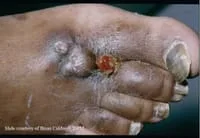Before the AIDS epidemic, Kaposi's sarcoma was mostly seen in elderly Italian and Jewish men. This cancerous tumor of the connective tissue would take a long time to develop. In those with AIDS, Kaposi's sarcoma will progress quickly and may affect the lungs, skin, gastrointestinal tract, and other organs.
For those with AIDS, Kaposi's sarcoma is caused by a weakened immune system, HIV, and the human herpesvirus -8(HHV-8). Those

The tumors will present as bluish-red or purple bumps on the skin. They are reddish-purple because they are rich in blood vessels. The lesions will often first appear on the feet or ankles, and later the thighs, arms, hands, face, or any other part of the body. Symptoms include shortness of breath and bloody sputum.
Your doctor will perform a series of tests to determine if you have Kaposi's sarcoma, including a bronchoscopy, CT scan, endoscopy, and skin biopsy. They will treat the condition depending on how much the immune system is suppressed, the number and location of the tumors, and your symptoms. Options include antiviral therapy against HIV, combination chemotherapy, freezing, and radiation therapy.
Complications from treatment may include coughing and shortness of breath if the condition has reached the lungs and leg swelling that is painful or causes infections if the disease is in the lymph nodes of the leg.
Kaposi's Sarcoma is a condition treated by our four highly trained podiatrists: Dr. Jeffrey S. Kahn, Dr. Richard E. Ehle, Dr. Craig M. Kaufman, and Dr. Ayman M. Latif in our six offices: Rocky Hill CT, Bristol CT, Newington CT, Glastonbury CT, Middletown CT, and Kensington CT.

